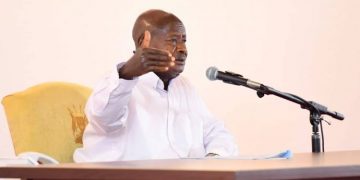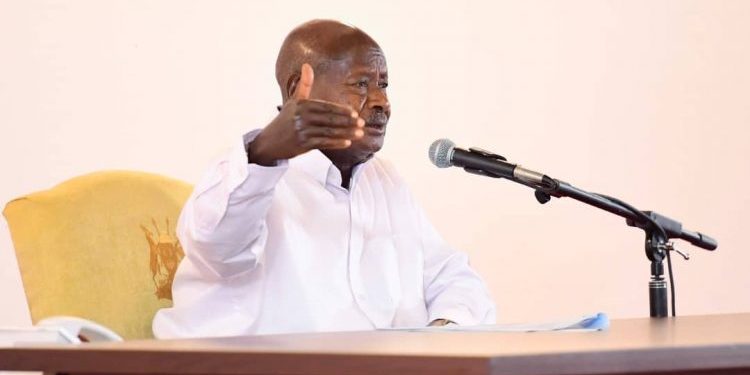President kaguta Museveni has advised opposition legislators to push for the speedy trial of their colleagues, Allan Ssewanyana (Makindye West) and Muhammad Ssegirinya (Kawempe North)instead of walking out of Parliament.
On Tuesday 28, members of the opposition led by the Leader of Opposition Mathias Mpuuga, stormed out of Parliament in protest of their colleagues’ re-arrest.
They also vowed never to return to parliament until their colleagues are released.
However during his address to the nation on Friday evening at State House Lodge in Nakasero, president Museveni said the MPs decision of storming out of Parliament was uncalled for.
“I would say, have a quick trial so that innocence comes out. That is what an honest person does. If suspect is innocent, those connected to him should push for expeditious trial. If you are innocent, demand a quick trial. Don’t demand impunity, untouchability but expeditious trial. But people don’t want the investigations to be concluded.” Museveni said.
He added, “If I was one of the suspects or even were members of my party and accused of such serious crime, I would press for working expeditiously to prove whether it is correct or not,”
Museveni noted that it is wrong for some people to think that MPs are untouchable even after being accused of committing crime.
“You hear some people say how can Members of Parliament be arrested? What if they commit a crime! Do they have right to kill our people with impunity….We shall ensure full accountability,” Museveni said.
Museveni on Bail and Bond
Miseveni reechoed his stand on scrapping bail application on suspects of capital offences such as murder.
“The remaining problem is some of the judicial officers and police. Some judicial officers do things that have no connection with reality. In the case of Masaka, so many people have died and suspects are given bail. And we are told bail is a right. Bail of criminals is a right. How about right of the victims? They have no right,” he said.
“Look at the right of the suspect but also the right for the victim. The victim is dead and your attention is on the suspect and nothing for the victim, the system is more on the side of suspects instead of victims,” he said.
President Museveni also said it is unfair to see a person accused of murder roam freely in society after being released on police bond.
Section 17(3) of the Criminal Procedure Code Act says where, a person’s being taken into custody in the circumstances mentioned in subsection (1) it appears to the police officer in charge of the police states which the person is brought that the inquiry into the case cannot be completed forthwith, he or she may release that person on his or her executing a bond, with or without sureties, for a reasonable amount to appear at such a police station and at such a time as is named in the bond unless he or she previously receives a notice in writing from the officer in charge of that police station that his or her attendance is not required.
It adds, “and any such bond may be enforced as if it were conditioned for the appearance of that person before the magistrate’s court having jurisdiction in the area in which the police station named in the bond is situated.
Bail
The constitution says that where a person is arrested in respect of a criminal offence, they are entitled to apply to the court to be released on bail and the court may grant that person bail on such conditions as the court considers reasonable.
It also says that in the case of an offence which is triable by the High Court as well as by a subordinate court, the person shall be released on bail on such conditions as the court considers reasonable, if that person has been remanded in custody in respect of the offence before trial for 120 days.
The Constitution adds that in the case of an offence triable only by the High Court the person shall be released on bail on such conditions as the Court considers reasonable, if the person has been remanded in custody for three hundred and sixty days before the case is committed to the High Court.
The basis of this provision is found in Article 28 of the same Constitution which states that an accused person is to be presumed innocent until he/she is proved or he/she pleads guilty.









